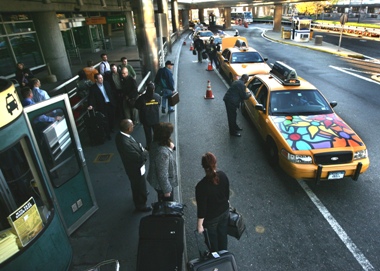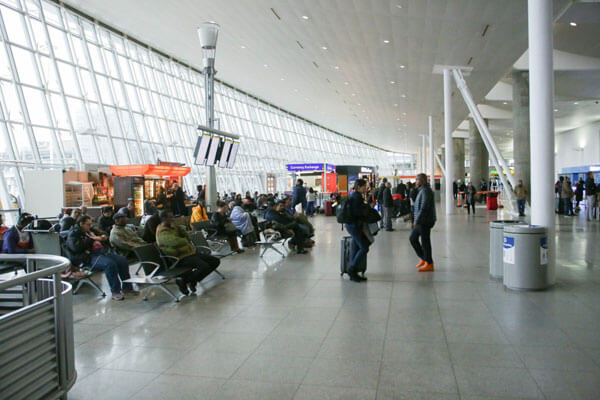Two Rego Park men were indicted for allegedly conspiring with Russian nationals to hack the taxi dispatch system at JFK International Airport and charge taxi drivers fees that allowed them to cut long wait lines at the terminals for years.
Daniel Abayev and Peter Leyman, both 48, were arrested Tuesday morning in Queens and charged with two counts each of conspiracy to commit computer intrusion, according to prosecutors from the Southern District of New York.
As alleged in the indictment, beginning in Sept. 2019, Abayev and Leyman, who are U.S. citizens living in Rego Park, and Russian hackers engaged in a scheme to game the system at JFK. At all relevant times, taxi drivers who sought to pick up a fare at JFK were required to wait in a holding lot at JFK before being dispatched to a specific terminal by the dispatch system.
Drivers were frequently required to wait several hours in the lot and were dispatched in approximately the order in which they arrived at the lot. Abayev and Leyman explored and attempted various mechanisms to access the dispatch system, including bribing someone to insert a flash drive containing malware into computers connected to the system, obtaining unauthorized access to the system via a Wi-Fi connection, and stealing information from computer tablets connected to the system. The two defendants sent messages to the Russian hackers in which they explicitly discussed their intention to hack the system.
“I know that the Pentagon is being hacked,” Abayev texted to the hackers. “So, can’t we hack the taxi industry?”
Abayev, Leyman and the Russian hackers developed a scheme to move taxis to the front of the line charging the drivers $10 at a time. Before long, the scheme used large group chat threads in order to communicate with drivers. For instance, when the system was accessed for the day, one of them would message the group thread with a “shop’s open” text.
Abayev also sent messages to large groups of drivers in the chat threads instructing them on how to avoid detection by law enforcement when using trips purchased from the schemers. Cabbies learned about the scheme through word of mouth, and some were allowed to cut the line for free if they recruited other taxi drivers who were willing to pay, prosecutors alleged.
Abayev and Leyman were able to move as many as a thousand drivers a day to the front of the lines until Nov. 2020, according to the indictment.
“As alleged in the indictment, these two defendants — with the help of Russian hackers — took the Port Authority for a ride,” said U.S. Attorney Damian Williams. “For years, the defendants’ hacking kept honest cab drivers from being able to pick up fares at JFK in the order in which they arrived. Now, thanks to this office’s teamwork with the Port Authority, these defendants are facing serious criminal charges for their alleged cybercrimes.”
Williams praised the work of the Port Authority Office of the Inspector General.
“This sophisticated, internationally coordinated conspiracy allegedly targeted hard-working taxi drivers trying to earn an honest living,” Port Authority Inspector General John Gay said. “The Port Authority has zero tolerance for bad actors violating the law at our facilities. We thank Damian Williams and the Southern District for their partnership as we continue our relentless commitment to detecting and disrupting illegal behavior at our facilities across the region.”
Abayev and Leyman face up to 10 years in prison if convicted.



































